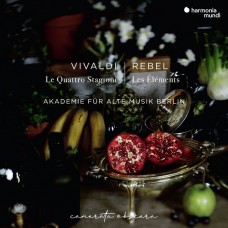柏林古樂學會樂團
皇家禮拜堂合唱團
在十八世紀的義大利和法國, 純樂器演奏音樂被認為是缺少任何意義而且除了像(四季)這種附帶文學認證( literary argument)或是有舞蹈動作的(元素)等作品, 是無法感動識份子的. 早在李斯特的交響詩出現之前, 韋瓦第和雷貝爾以此專輯中的兩件作品證明了他們能創造出生動的, 敘述性的純樂器音樂, 令人讚佩的符合啟蒙時期哲學的本體論(ontological), 審美觀與道德的需求.
In the eighteenth century, in both Italy and France, instrumental music was regarded as devoid of all signification and unable to affect the intellect unless it was accompanied by a literary argument (like The Four Seasons) or a choreographic action (like Les Elements). Long before the symphonic poems of Franz Liszt, Vivaldi and Rebel – both of whom owe their claim on posterity to the works recorded here – showed they could create lively, descriptive instrumental music, admirably meeting the ontological, aesthetic and moral requirements of Enlightenment philosophy |
JEAN-FERY REBEL (1666-1747)
Les Elements (1737)
1. I. Le Chaos 6'52
2. II. Loure I 1'59
3. III. Chaconne 3'13
4. IV. Ramage 1'06
5. V. Rossignols 1'43
6. VI. Loure II - la chasse 1'47
7. VII. Tambourins I & II 2'25
8. VIII. Sicilienne 1'13
9. IX. Rondeau 1'23
10. X. Caprice 2'39
11. Chaconne (reprise) 3'05
ANTONIO VIVALDI (1678-1741)
Le Quattro Stagioni (1725)
I. Allegro 3'27
13. II. Largo 1'57
14. III. Allegro 3'55
L'estate
15. I. Allegro non molto - Allegro 4'47
16. II. Adagio - Presto - Adagio 1'48
17. III. Presto 2'48
L'autunno
18. I. Allegro 5'02
19. II. Adagio molto 2'45
20. III. Allegro 3'04
L'inverno
21. I. Allegro non molto 3'21
22. II. Largo 1'47
23. III. Allegro 2'56 |
|



